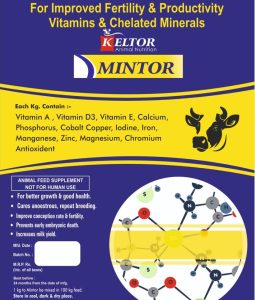KELTOR’ MINTOR is a cattle feed supplement is an added source of nutrients designed to improve the overall diet and health of cattle. These supplements are typically used to enhance performance, support growth, increase milk production, improve reproductive health, and ensure the proper balance of essential nutrients. Cattle feed supplements come in many forms, such as pellets, powders, liquids, and blocks, and they are often formulated to address specific needs based on the type of cattle (beef or dairy), their age, and their production stage (e.g., growing, lactating, or finishing).

Cattle feed supplements are a valuable tool for optimizing the health, growth, and productivity of cattle. The right supplements, when properly formulated and used, can significantly improve performance in beef and dairy operations. However, it’s important to tailor supplementation to the specific needs of the cattle, monitor their response, and consult with professionals for the best results.
Common Types of Cattle Feed Supplements:
- Protein Supplements
These are often required when cattle are in need of additional protein, particularly for growing animals, lactating cows, or those in high production stages. Common sources of protein include:- Soybean meal: High in digestible protein.
- Alfalfa: A good source of both fiber and protein.
- Canola meal: Another protein-rich supplement with a slightly different amino acid profile than soybean meal.
- Distillers grains: A byproduct of ethanol production, offering both protein and energy.
- Energy Supplements
Energy supplements help cattle maintain or gain weight, particularly during periods of high energy demand (like lactation or finishing for market). These include:- Corn and barley: High-starch grains that are energy-dense.
- Molasses: A palatable and highly fermentable sugar source.
- Vegetable oils or grains (like wheat germ): Used to increase the energy density of the diet, particularly in finishing cattle.
- Mineral and Vitamin Supplements
Cattle require a range of minerals and vitamins to maintain proper health, and deficiencies can lead to various health issues, including poor growth, reduced milk production, or infertility. Supplements can provide:- Calcium and phosphorus: Crucial for bone health and lactation in dairy cows.
- Magnesium: Important for nerve and muscle function, especially during periods of stress like grazing lush pastures.
- Vitamins A, D, and E: Key for immune function, growth, and overall health.
- Fiber Supplements
Fiber is essential for healthy digestion and rumen function in cattle. These supplements help cattle break down food more efficiently and are necessary when high-fiber forages are limited.- Alfalfa hay: High in fiber, helping with rumen motility.
- Silage: Corn or grass silage provides a good balance of fiber and energy.
- Probiotics and Prebiotics
Probiotics contain beneficial microorganisms that help maintain a healthy balance of bacteria in the rumen, improving digestion and overall health. Prebiotics are ingredients that support the growth of these beneficial bacteria. Common examples include:- Live yeast cultures: Improve rumen fermentation and efficiency.
- Lactobacillus: A type of probiotic that enhances gut health and digestion.
- Fatty Acids and Omega-3s
Fatty acid supplements are often used to improve the health and quality of the cattle’s meat or milk. They can also support reproduction, immunity, and overall health.- Fish oil: Rich in omega-3 fatty acids, improving milk composition and reproductive health.
- Flaxseed: High in omega-3s and a good plant-based source of healthy fats.
- Ruminal Buffers
Ruminal buffers help maintain the proper pH balance in the rumen, preventing acidosis (a condition that occurs when the rumen becomes too acidic, often due to high grain intake). Sodium bicarbonate and magnesium oxide are commonly used to buffer stomach acid. - Electrolytes and Hydration Supplements
During hot weather or stressful conditions (like transportation or illness), cattle may need supplements to maintain proper hydration and electrolyte balance.- Electrolytes: Provide salts like sodium and potassium to help maintain fluid balance.
- Water-soluble vitamins and minerals: Used to ensure hydration and prevent deficiencies during stress.
